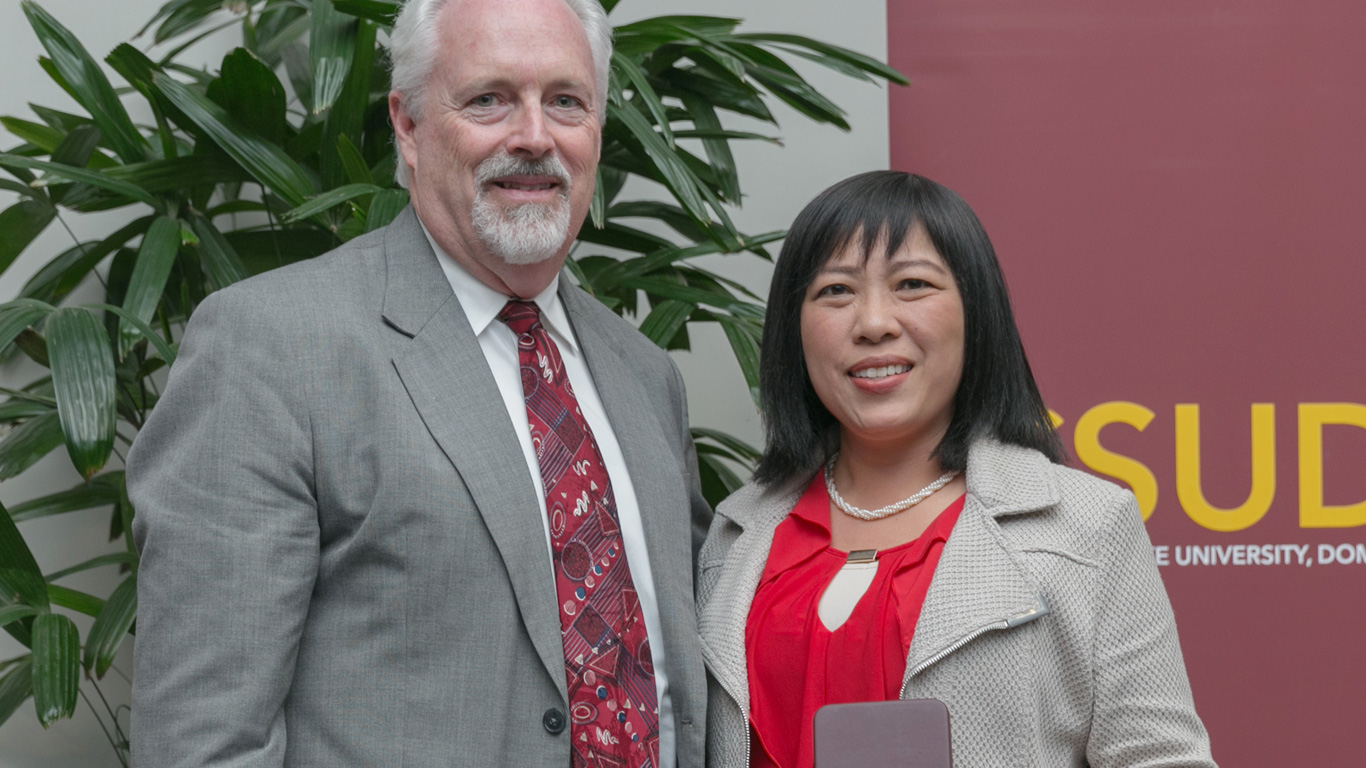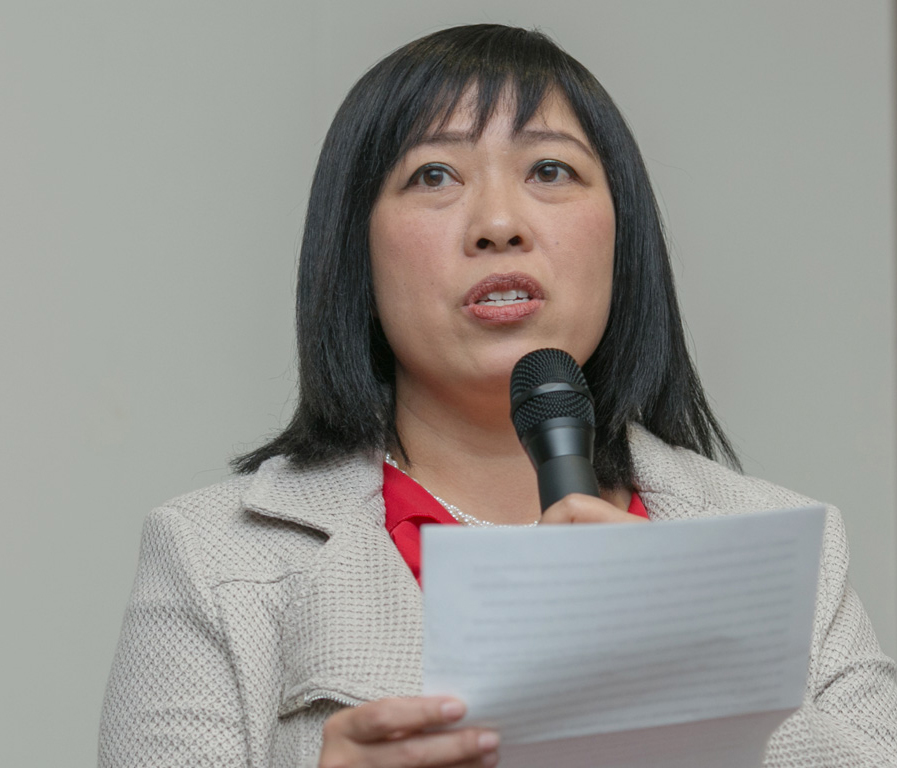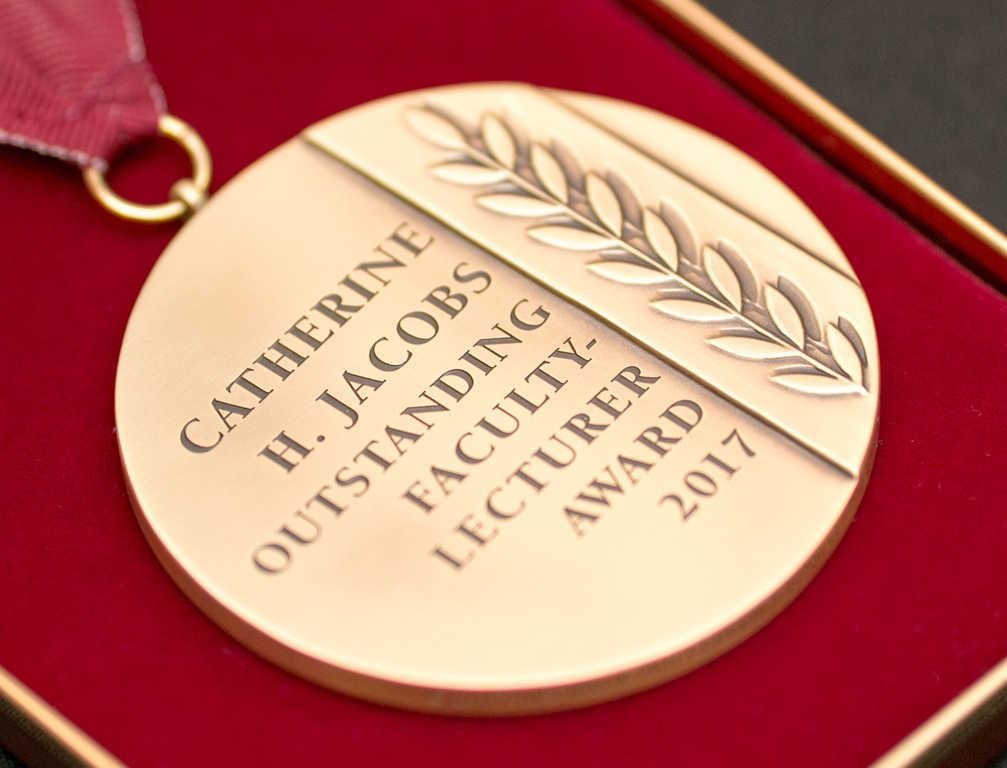
A Q&A with Mary T. Lacanlale, interim coordinator of the Asian Pacific Studies program, the 2017 “Catherine H. Jacobs, Outstanding Faculty Lecturer Award” winner.
Non-tenure track lecturers play a valuable part in the academic success of students and the university community as a whole, and the Catherine H. Jacobs Outstanding Faculty Lecturer Award acknowledges their contribution by recognizing an individual who has demonstrated excellence in teaching effectiveness and overall contribution to California State University, Dominguez Hills.
Mary T. Lacanlale has been a lecturer at CSUDH since 2011, teaching courses in the Asian-Pacific studies and humanities programs. She currently is interim coordinator for Asian-Pacific studies, and is active on campus serving on Academic Senate and various committees, most recently the committee to plan activities around the 75th anniversary of Executive Order 9066, which resulted in the mass incarceration of Japanese Americans during World War II.
 Lacanlale has published widely on Filipino cultural shows, investigating the ways that American-born Filipinos use Philippine music and dance as a way to learn about their heritage and history. Her book-in-progress, “Instruments of Empire: Brass Bands, Black Soldiers, and American Imperialism in the Philippines,” is about the intersection of music and race. She examines how American audiences racialized the musical performances of a Filipino military brass band led by an African-American officer during the early 20th century. Other recent publications include: “Muslim Filipino Traditions in Filipino American Popular Culture,” in which she wrote the chapter “Muslim and American Popular Culture” (2014); and the chapter “Mixed Blessing: The Impact of the American Colonial Experience on Politics and Society in the Philippines,” for the publication “Marching to ‘Progress:’ Music, Race, and Imperialism at the 1904 St. Louis World’s Fair,” (2013). Lacanlale is a recipient of the Fulbright (IIE) Fellowship, Ford Dissertation Fellowship, and Mellon Postdoctoral Fellowship, and was recently appointed president of the Southern California-Hawaii Chapter of the Society for Ethnomusicology..
Lacanlale has published widely on Filipino cultural shows, investigating the ways that American-born Filipinos use Philippine music and dance as a way to learn about their heritage and history. Her book-in-progress, “Instruments of Empire: Brass Bands, Black Soldiers, and American Imperialism in the Philippines,” is about the intersection of music and race. She examines how American audiences racialized the musical performances of a Filipino military brass band led by an African-American officer during the early 20th century. Other recent publications include: “Muslim Filipino Traditions in Filipino American Popular Culture,” in which she wrote the chapter “Muslim and American Popular Culture” (2014); and the chapter “Mixed Blessing: The Impact of the American Colonial Experience on Politics and Society in the Philippines,” for the publication “Marching to ‘Progress:’ Music, Race, and Imperialism at the 1904 St. Louis World’s Fair,” (2013). Lacanlale is a recipient of the Fulbright (IIE) Fellowship, Ford Dissertation Fellowship, and Mellon Postdoctoral Fellowship, and was recently appointed president of the Southern California-Hawaii Chapter of the Society for Ethnomusicology..
When not teaching, she leads workshops on Philippine gong music and performs with the Pakaraguian Kulintang Ensemble on Philippine gongs.
Q: Tell me a little about your upbringing.
A: My parents immigrated to the U.S. in their mid-20s, from the Philippines to Boston, Mass., to do their medical fellowships at Tufts University. It was the middle of the Blizzard of 1978, and I’m sure it was a huge shock to them. They settled in a small town 30 minutes south of Boston, which was not very diverse. My closest friends were Irish Americans because they were all Catholic, and had some similar traditions. Today, my elementary school-aged kids go to school in Cerritos, which is very diverse. It helps me appreciate all the different cultures here in Southern California.
 Q: How did you feel to learn you would be honored with a 2017 Faculty Award?
Q: How did you feel to learn you would be honored with a 2017 Faculty Award?
A: I felt honored to be recognized for the effort I put into teaching and to connecting with the diverse students of Cal State Dominguez Hills. I admire my students’ tenacity to get an education, despite the many challenges they face. We had some amazing growth in our program this year, and I think it is due to our efforts to reach out and support students’ social and cultural experiences, in addition to their educational paths. In this part of California, people come into contact with Asian-American culture all the time, and they enjoy learning more deeply about it.
Q: So why Asian Pacific studies? Is there a unique reason beyond you heritage that you chose the field?
A: Many people might assume that I chose it because of my Asian-Pacific heritage–I’m of Filipino descent–but I went into this because I didn’t grow up in Asian, or even Asian American, culture or with friends of Asian heritage. So I yearned to learn more about and experience Asian cultures and traditions. I have played classical piano and cello since I was 10, and knew everything about European classical music, but I didn’t know anything about the music of Asia, or the Philippines. My uncle came to live with us for a couple of years when I was in high school. He was a professor of history in the Philippines and his background was Tausug–Muslim Filipino, and although he converted to Catholicism, he was deeply proud of his traditions, including music. It was then that I knew that I wanted to be a professor and to research indigenous Filipino cultures. As a Fulbright scholar, I researched the lives of Muslim Filipinos for 18 months in the Philippines. It wasn’t until I was a graduate student at UCLA that I finally learned to speak Tagalog, but with a thick American accent.
Q: From your perspective, why is it important to study Asian Pacific culture?
A: I think it is crucial to have an understanding of different Asian countries and cultures in today’s world. For international business, this is a must. In addition, if you are living and working in southern California, knowledge about people of Asian descent is important for working in health sciences, community work, and education. Despite the large communities of Asian Americans here, there is not enough knowledge or research about them, their contributions to society, or their lives.
Q: In what way do you best encourage your students to appreciate Asian Pacific culture?
A: The most rewarding part of my semester is when my students present their research projects. They use their new critical knowledge about Asian-American social and cultural history to understand their world in new ways. They interview Asian-American family members, neighbors, friends, coworkers, and owners of businesses they already frequent to see them in a new light. In the end, they usually have renewed appreciation for their struggles, which is great because issues that Asian Americans deal with are so invisible in our society.
Q: What’s so great about teaching at Cal State Dominguez Hills?
A: Seeing my students grow as critical thinkers, and then bring that skill back to their communities.
Q: Is there someone at CSUDH who you admire as an educator?
A: I have a lot of admiration for (Professor Emeritus of History) Don Hata. Whenever I hear him speak about his time as a child in an incarceration camps during WWII, to earning a Ph.D. from USC and becoming a tenured professor here at CSUDH, I am in awe. He speaks with eloquence, conviction, passion, and connects with students in a way to which I can only aspire.
Shell is a supporter of the Faculty Awards program and reception, which recognizes Faculty Awards of Excellence recipients and faculty members who have reached years of service milestones.